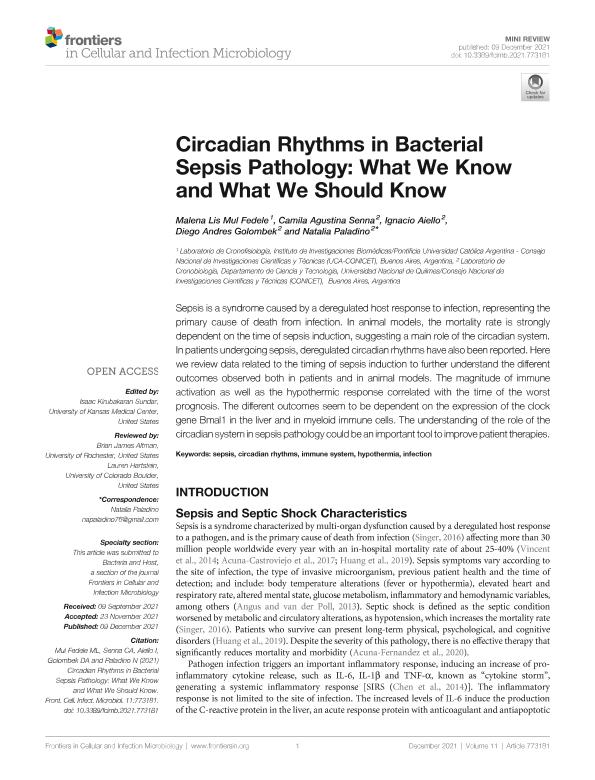Mostrar el registro sencillo del ítem
dc.contributor.author
Mul Fedele, Malena Lis

dc.contributor.author
Senna, Camila Agustina

dc.contributor.author
Aiello, Ignacio

dc.contributor.author
Golombek, Diego Andrés

dc.contributor.author
Paladino, Natalia

dc.date.available
2022-04-13T12:53:13Z
dc.date.issued
2021-12-09
dc.identifier.citation
Mul Fedele, Malena Lis; Senna, Camila Agustina; Aiello, Ignacio; Golombek, Diego Andrés; Paladino, Natalia; Circadian rhythms in bacterial sepsis pathology: What we know and what we should know; Bacteria and Host; Frontiers in Cellular and Infection Microbiology; 11; 773181; 9-12-2021; 1-8
dc.identifier.uri
http://hdl.handle.net/11336/155167
dc.description.abstract
Sepsis is a syndrome caused by a deregulated host response to infection, representing the primary cause of death from infection. In animal models, the mortality rate is strongly dependent on the time of sepsis induction, suggesting a main role of the circadian system. In patients undergoing sepsis, deregulated circadian rhythms have also been reported. Here we review data related to the timing of sepsis induction to further understand the different outcomes observed both in patients and in animal models. The magnitude of immune activation as well as the hypothermic response correlated with the time of the worst prognosis. The different outcomes seem to be dependent on the expression of the clock gene Bmal1 in the liver and in myeloid immune cells. The understanding of the role of the circadian system in sepsis pathology could be an important tool to improve patient therapies.
dc.format
application/pdf
dc.language.iso
eng
dc.publisher
Bacteria and Host
dc.rights
info:eu-repo/semantics/openAccess
dc.rights.uri
https://creativecommons.org/licenses/by/2.5/ar/
dc.subject
SEPSIS
dc.subject
CIRCADIAN RHYTHMS
dc.subject
IMMUNE SYSTEM
dc.subject
HYPOTHERMIA
dc.subject
INFECTION
dc.subject.classification
Enfermedades Infecciosas

dc.subject.classification
Ciencias de la Salud

dc.subject.classification
CIENCIAS MÉDICAS Y DE LA SALUD

dc.title
Circadian rhythms in bacterial sepsis pathology: What we know and what we should know
dc.type
info:eu-repo/semantics/article
dc.type
info:ar-repo/semantics/artículo
dc.type
info:eu-repo/semantics/publishedVersion
dc.date.updated
2022-04-07T22:28:25Z
dc.identifier.eissn
2235-2988
dc.journal.volume
11
dc.journal.number
773181
dc.journal.pagination
1-8
dc.journal.pais
Estados Unidos

dc.description.fil
Fil: Mul Fedele, Malena Lis. Pontificia Universidad Católica Argentina "Santa María de los Buenos Aires". Instituto de Investigaciones Biomédicas. Consejo Nacional de Investigaciones Científicas y Técnicas. Oficina de Coordinación Administrativa Houssay. Instituto de Investigaciones Biomédicas; Argentina
dc.description.fil
Fil: Senna, Camila Agustina. Universidad Nacional de Quilmes. Departamento de Ciencia y Tecnología. Laboratorio de Cronobiología; Argentina. Consejo Nacional de Investigaciones Científicas y Técnicas; Argentina
dc.description.fil
Fil: Aiello, Ignacio. Universidad Nacional de Quilmes. Departamento de Ciencia y Tecnología. Laboratorio de Cronobiología; Argentina. Consejo Nacional de Investigaciones Científicas y Técnicas; Argentina
dc.description.fil
Fil: Golombek, Diego Andrés. Universidad Nacional de Quilmes. Departamento de Ciencia y Tecnología. Laboratorio de Cronobiología; Argentina. Consejo Nacional de Investigaciones Científicas y Técnicas; Argentina
dc.description.fil
Fil: Paladino, Natalia. Universidad Nacional de Quilmes. Departamento de Ciencia y Tecnología. Laboratorio de Cronobiología; Argentina. Consejo Nacional de Investigaciones Científicas y Técnicas; Argentina
dc.journal.title
Frontiers in Cellular and Infection Microbiology
dc.relation.alternativeid
info:eu-repo/semantics/altIdentifier/url/https://www.frontiersin.org/articles/10.3389/fcimb.2021.773181/full
dc.relation.alternativeid
info:eu-repo/semantics/altIdentifier/doi/http://dx.doi.org/10.3389/fcimb.2021.773181
Archivos asociados
